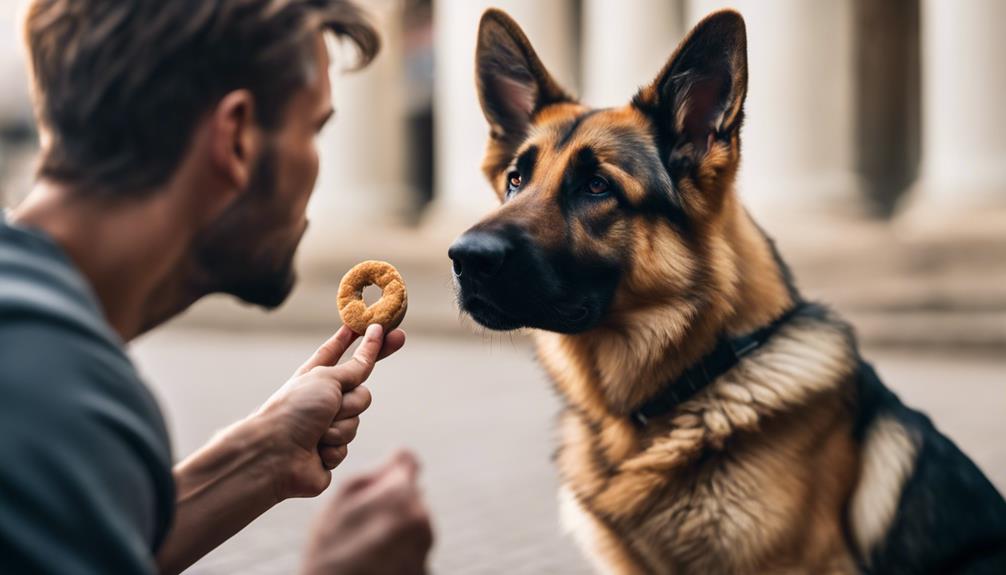🐾 Paw-some Partnership Alert! 🐾
As a pack of German Shepherd enthusiasts at MixGermanShepherd.com, we're always sniffing out the best products for our furry friends. Guess what? When you fetch something from Amazon through our links, we earn a little treat! 🦴
When training your German Shepherd mix puppy, remember the importance of early socialization, positive reinforcement, and consistent methods. These intelligent and loyal pups thrive on mental stimulation and exercise. By instilling basic obedience commands early on, you lay the groundwork for a well-rounded companion. But how can you navigate the complexities of behavioral training to ensure a happy and well-behaved furry friend?
Key Takeaways
- Start early to establish good habits and shape behavior effectively.
- Focus on socialization to enhance cognitive abilities and emotional well-being.
- Utilize positive reinforcement techniques for obedience and bonding.
- Seek professional guidance for personalized training plans and long-term behavioral impact.
Starting Behavioral Training Early
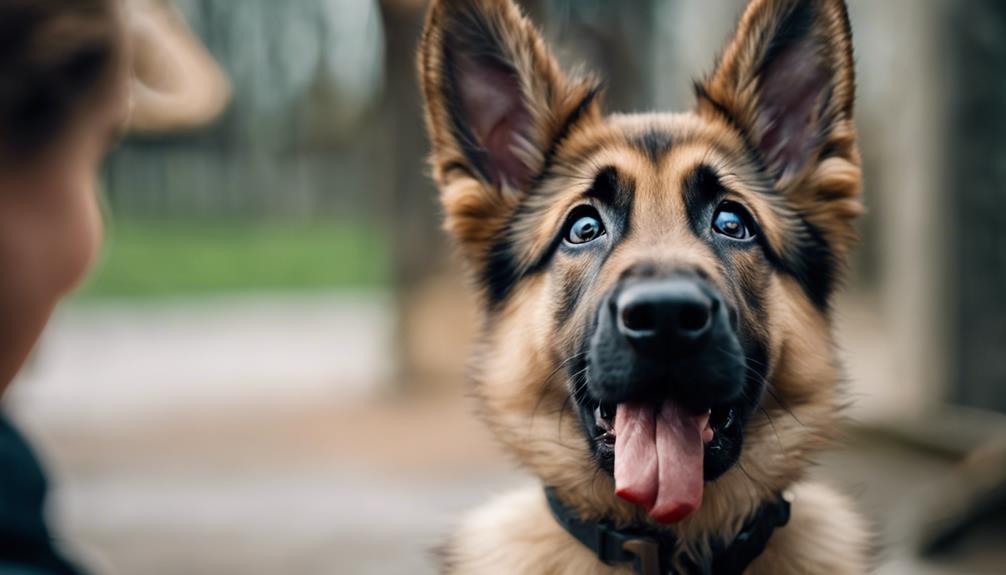
To establish good habits and prevent future behavioral issues, starting behavioral training early is crucial for German Shepherd mix puppies. Early training plays a significant role in shaping the behavior and responses of your puppy. By introducing positive reinforcement techniques from the beginning, you can set the foundation for a well-behaved adult dog. German Shepherd mixes are known for their intelligence and eagerness to please, making them receptive to training at a young age. Consistency in training methods and patience are key when working with a puppy, as they are still learning and developing.
When you begin early training with your German Shepherd mix puppy, focus on socialization and exposure to various environments. This exposure helps them become comfortable with different situations, people, and animals, reducing the likelihood of fear or aggression as they grow older. By starting training early and incorporating positive reinforcement techniques, you are not only helping your puppy become well-behaved but also fostering a strong bond based on trust and respect.
Socialization Techniques
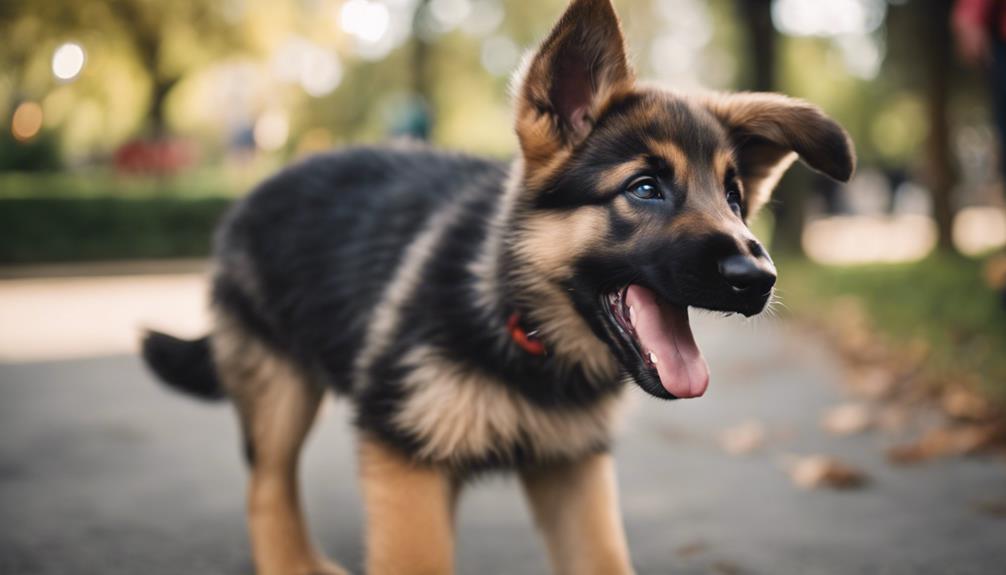
Starting early with socialization techniques is crucial for German Shepherd mix puppies, as it helps them become well-adjusted and confident adult dogs. When socializing your German Shepherd mix puppy, consider the following techniques:
- Expose to Various Environments: Introduce your puppy to different environments such as parks, streets, and indoor settings to help them adapt to various surroundings.
- Positive Interactions: Encourage positive interactions with people, animals, and objects to build confidence and prevent fear or aggression.
- Supervised Play: Engage your puppy in supervised play with other well-socialized dogs to enhance their social skills and communication abilities.
- Different Sounds and Textures: Gradually expose your puppy to different sounds, sights, and textures to reduce anxiety and fear responses, helping them become more adaptable.
- Consistent Efforts: Consistency in socialization efforts during the critical period is key to raising a well-adjusted and resilient adult dog.
Crate Training Methods
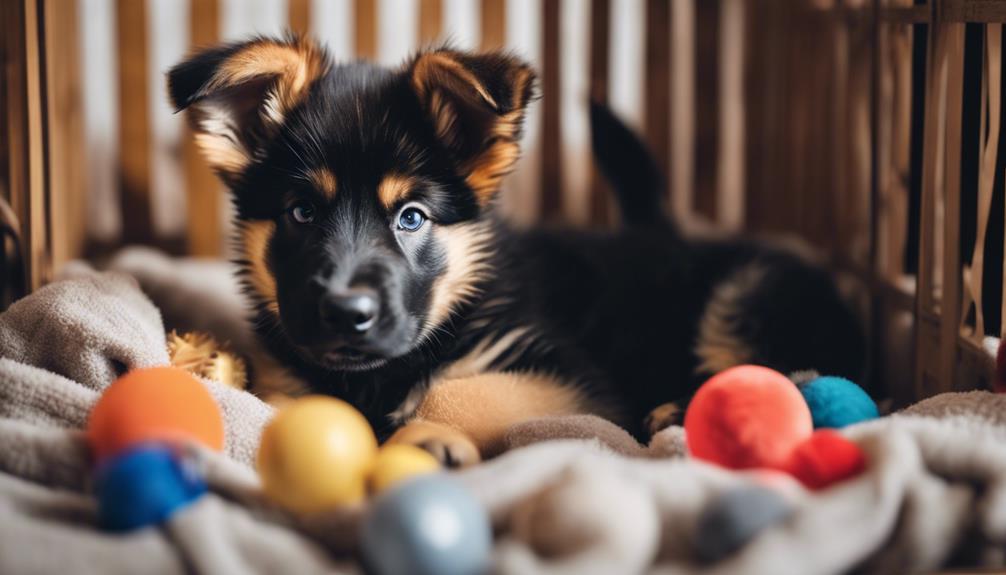
When introducing crate training methods to your German Shepherd mix puppy, gradual and positive associations are key for creating a safe and comfortable space. Begin by placing treats and toys inside the crate to entice your puppy to explore it willingly. Use the crate for short periods initially, allowing your puppy to feel secure and prevent anxiety. It's crucial to avoid using the crate as punishment to maintain positive associations with this designated area. As your puppy becomes accustomed to the crate, gradually increase the time spent inside to aid in housetraining and deter destructive behaviors. Remember, the crate should always be a positive and safe haven for your German Shepherd mix puppy, not a place of reprimand. By following these guidelines, you can effectively utilize crate training to instill good behaviors and create a secure environment for your furry companion.
Effective Potty Training Tips
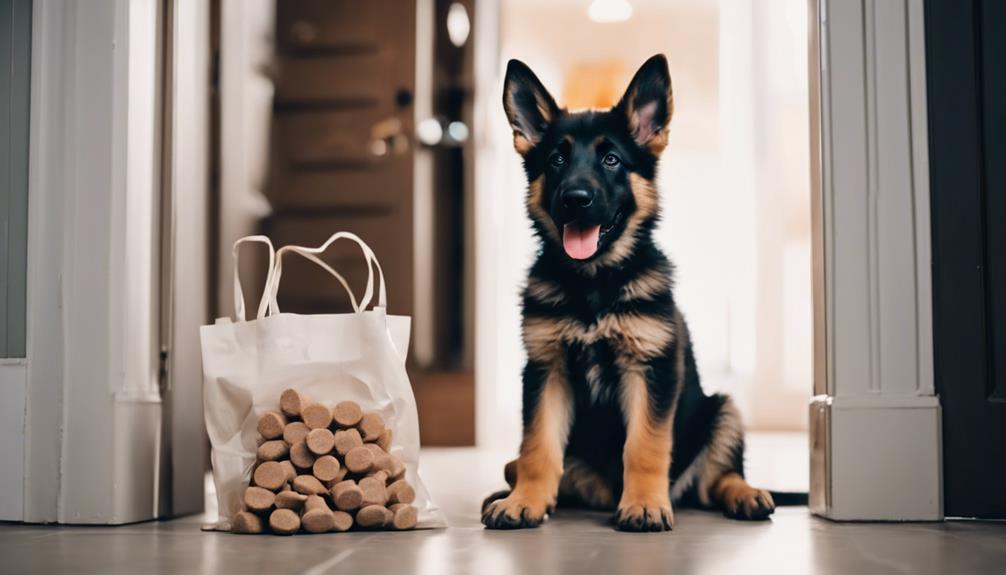
Establishing a consistent potty schedule for your German Shepherd mix puppy is crucial for successful potty training. When embarking on this journey with your furry friend, consider the following tips:
- Age and Activity Level: Tailor the potty schedule to match your puppy's age and energy levels, ensuring frequent opportunities to go outside.
- Positive Reinforcement: Use treats and praise to reward your puppy when they potty in the right spot, reinforcing good behavior.
- Monitor Behavior: Watch for signs like sniffing, circling, or restlessness that indicate your puppy needs to relieve themselves.
- Accidents Happen: Clean up accidents promptly using an enzymatic cleaner to eliminate odors that might attract repeat incidents.
- Patience and Persistence: Remember that potty training takes time and effort; be patient with your puppy and stay persistent in your training approach.
Obedience Training Essentials
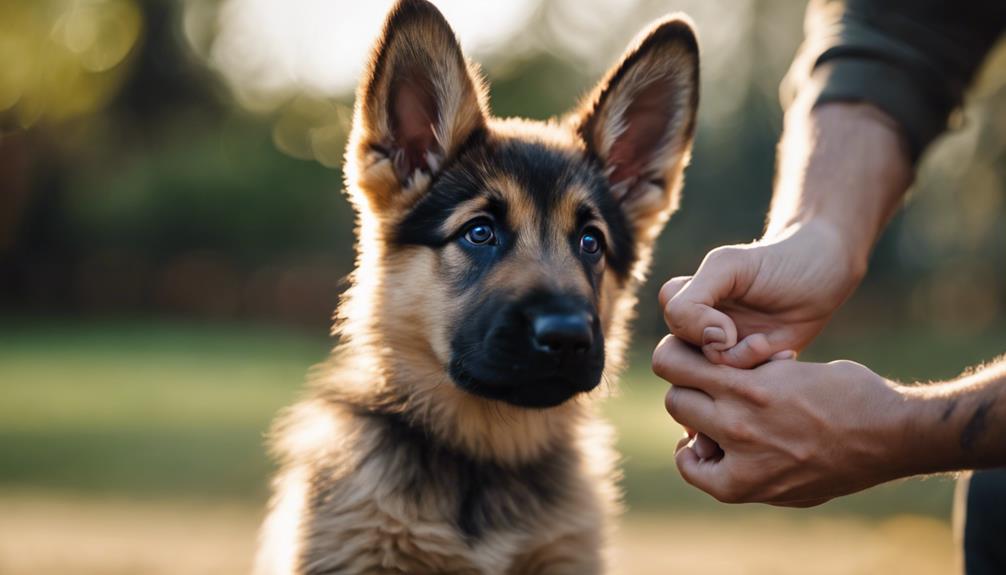
When training your German Shepherd mix puppy, remember that focusing on basic commands like sit, stay, come, and leash walking is essential for laying a strong obedience foundation. Consistent training and positive reinforcement are key components in shaping your puppy's behavior and ensuring they respond well to commands. By keeping training sessions short and engaging, you can maintain your puppy's interest and eagerness to learn.
Basic Commands for Puppies
To effectively train your German Shepherd mix puppy, begin by introducing basic commands such as sit, stay, come, and lie down using positive reinforcement techniques. Consistency in training sessions is crucial for your puppy to grasp and adhere to these commands. Here are some key points to consider:
- Use treats and praise to reinforce good behavior.
- Keep training sessions short and frequent.
- Gradually increase the difficulty of commands as your puppy progresses.
- Practice patience and understanding during training.
- Celebrate small victories to motivate your puppy.
Training Consistency Is Key
Consistently practicing obedience training with your German Shepherd mix puppy is fundamental for fostering a well-behaved and responsive companion. By maintaining consistency in training commands such as sit, stay, and come, you establish clear expectations and boundaries for your puppy. Utilizing positive reinforcement techniques during training sessions encourages desired behaviors and strengthens the bond between you and your furry friend. Regular training sessions not only build a solid foundation for obedience but also aid in effective behavior management. The table below highlights the significance of training consistency in shaping your German Shepherd mix puppy's behavior positively.
| Importance of Training Consistency | Benefits |
|---|---|
| Establishes clear expectations | Promotes well-behaved behavior |
| Reinforces positive behaviors | Strengthens bond with your puppy |
| Builds a foundation for obedience | Aids in effective behavior management |
| Fosters mutual understanding | Enhances responsiveness |
Leash Training Strategies
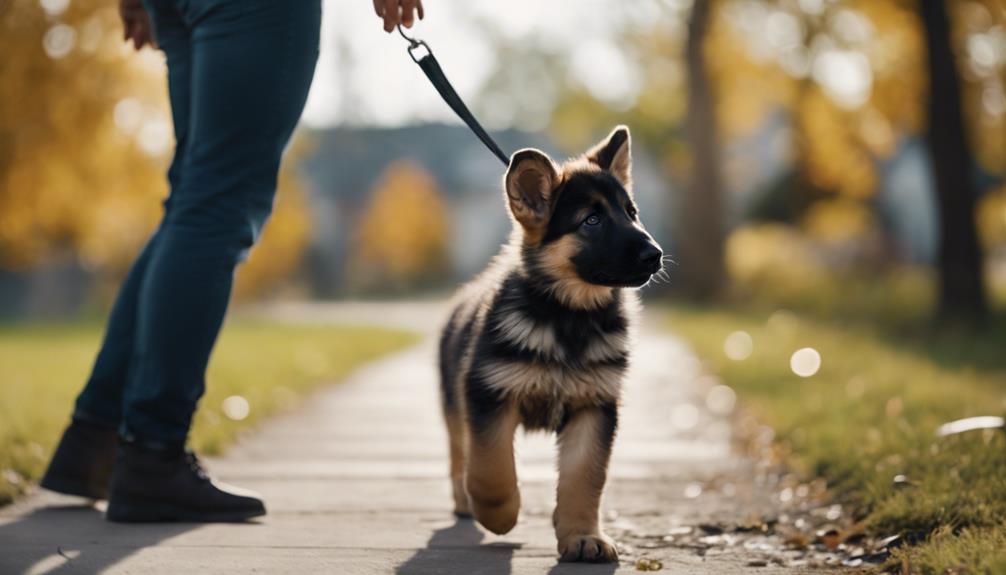
When it comes to leash training strategies for your German Shepherd mix puppy, proper leash handling, positive reinforcement techniques, and consistent practice sessions are crucial. Using treats and praise to reward good behavior can help reinforce positive leash walking habits. Remember to gradually increase the difficulty of training sessions to build your puppy's confidence and obedience.
Proper Leash Handling
Ensure control and safety during walks by using a sturdy leash and collar/harness combination when leash training German Shepherd mix puppies. To handle the leash properly, consider the following:
- Start in a Distraction-Free Environment: Begin training in a quiet space to help the puppy focus.
- Practice Loose Leash Walking: Reward the puppy for walking beside you without pulling.
- Use Positive Reinforcement: Encourage good behavior with treats and praise.
- Increase Distractions Gradually: Introduce challenges slowly to reinforce training.
- Maintain Consistency: Stick to a routine to establish good habits.
Positive Reinforcement Techniques
To enhance your German Shepherd mix puppy's leash training experience, focus on implementing positive reinforcement techniques that reward desired behaviors during walks. Consistently reward your puppy for walking nicely on the leash with treats, praise, or toys to reinforce good behavior. Utilize a clicker or verbal marker to signal the exact moment your puppy performs the desired behavior during leash training. Avoid using punishment or harsh corrections, as these can hinder the positive association with the leash and collar. By rewarding behavior and creating a positive environment, you will establish a trusting relationship with your German Shepherd mix puppy, making the walking experience enjoyable for both of you.
Consistent Practice Sessions
Consistent practice sessions play a vital role in shaping the leash training progress of German Shepherd mix puppies. When engaging in leash training with your puppy, consider the following strategies:
- Start Early: Begin leash training early to instill good habits and prevent disobedience during walks.
- Positive Reinforcement: Use treats and praise to encourage desired walking behavior in your German Shepherd mix puppy.
- Short Sessions: Opt for short and frequent training sessions to keep your puppy engaged and focused.
- Gradual Challenges: Increase the difficulty of exercises gradually to challenge your puppy and reinforce proper walking manners.
- Stay Engaged: Keep the training sessions exciting and interactive to maintain your puppy's interest and enthusiasm.
Managing Biting and Chewing
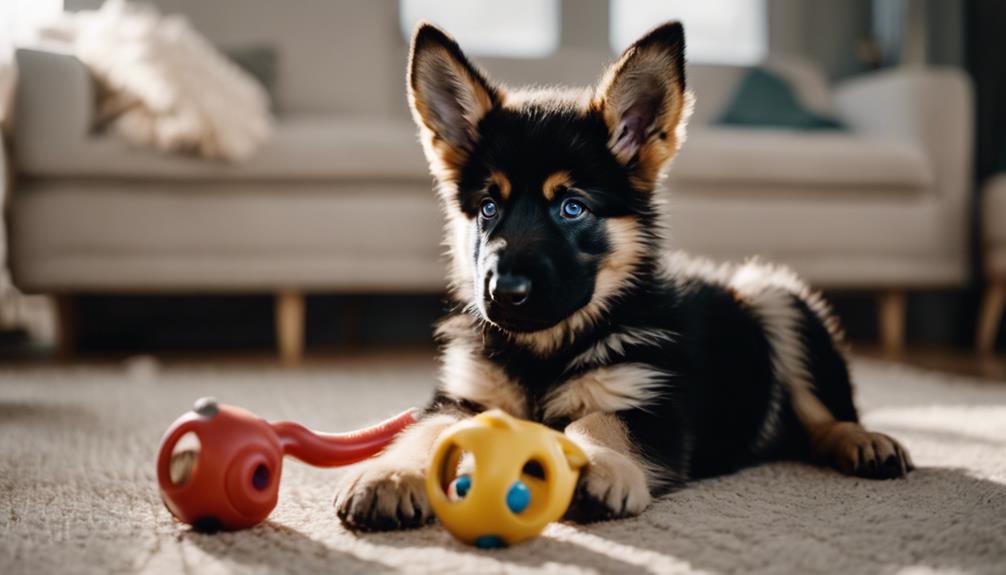
When addressing biting and chewing behaviors in German Shepherd mix puppies, redirecting their attention to appropriate chew toys is crucial for guiding their behavior effectively. German Shepherd mix puppies have a natural instinct to chew, especially during their teething phase. By providing them with a variety of chew toys that are safe and durable, you can redirect their biting behavior onto these approved items. Additionally, using positive reinforcement techniques, such as offering treats or praise when they chew on the designated toys, will help reinforce this desired behavior.
Consistently supervising your puppy and redirecting any inappropriate chewing or biting is essential in shaping their behavior. Alongside providing chew toys, incorporating mental and physical exercise into their routine can help prevent excessive chewing and biting out of boredom or pent-up energy. If despite your efforts the biting and chewing behaviors become unmanageable, seeking professional guidance is advisable to address any underlying issues effectively. Remember, patience and consistent training are key in managing biting and chewing behaviors in German Shepherd mix puppies.
Addressing Separation Anxiety
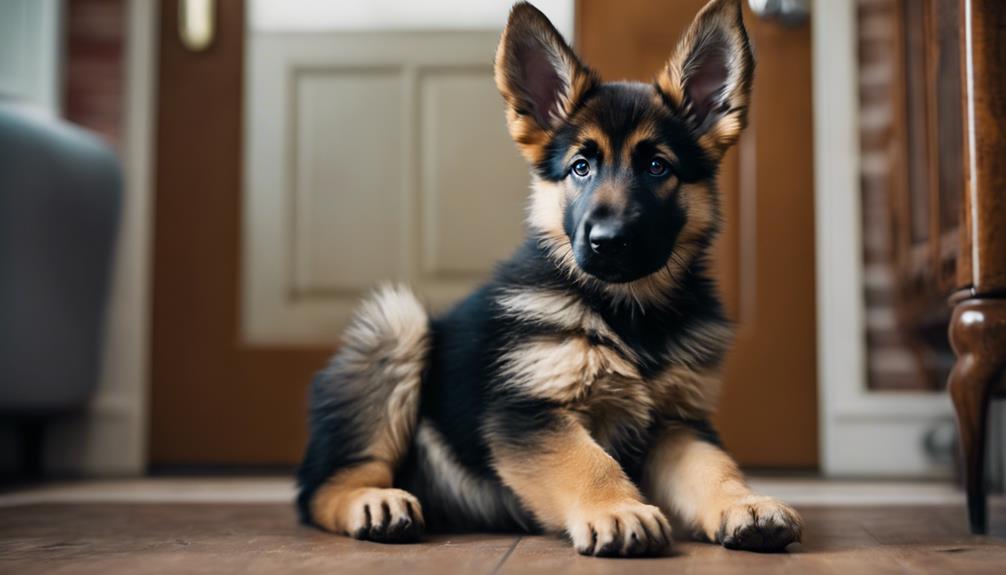
In addressing separation anxiety in German Shepherd mix puppies, understanding the common behavioral issue and its symptoms is crucial for implementing effective training strategies. Separation anxiety can manifest in various ways, such as excessive barking, destructive behavior, and house soiling when left alone. To help alleviate this issue, gradual desensitization and counterconditioning techniques are recommended. Providing interactive toys, puzzles, and safe spaces can also play a significant role in reducing stress and anxiety levels for your puppy. In severe cases, consulting with a professional dog trainer or behaviorist may be necessary to develop a tailored plan for your furry companion. By incorporating these strategies and seeking appropriate guidance, you can help your German Shepherd mix puppy overcome separation anxiety and lead a happier, more balanced life.
Building Impulse Control
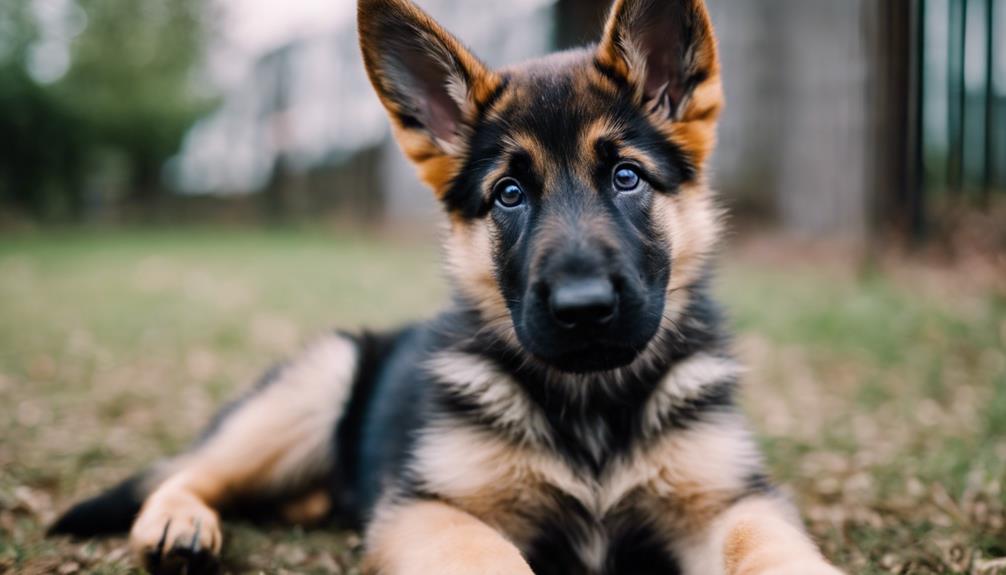
To help your German Shepherd mix puppy develop impulse control, start incorporating structured training exercises into your daily routine. Training focused on impulse control plays a crucial role in teaching your puppy patience, focus, and self-discipline. By setting boundaries and reinforcing obedience through consistent training, you can prevent impulsive behaviors like jumping and excessive barking. This type of training empowers your puppy to make better choices and exhibit self-restraint in various situations.
Here is a simple table to guide you on building impulse control in German Shepherd mix puppies:
| Training Tips | Description |
|---|---|
| Consistent Practice | Regularly practice impulse control exercises to strengthen self-discipline. |
| Reward Good Behavior | Use positive reinforcement to encourage your puppy when they show restraint. |
| Set Clear Boundaries | Establish clear rules and boundaries to guide your puppy's behavior. |
| Maintain Focus | Keep training sessions short and engaging to help your puppy stay focused. |
Advanced Training Activities
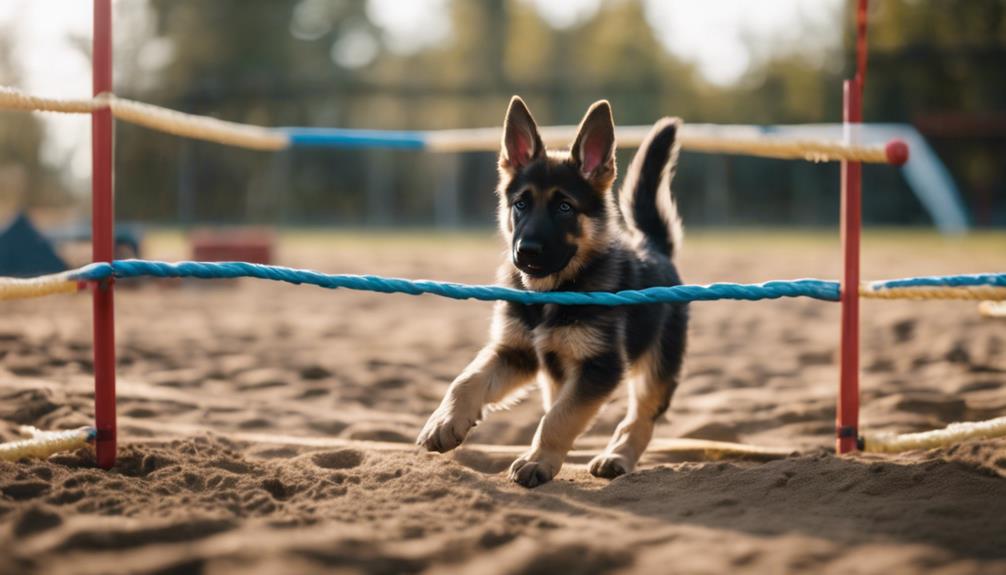
Engaging German Shepherd mix puppies in advanced training activities enhances their cognitive abilities and strengthens the bond between owner and pup. German shepherd mixes possess a remarkable blend of skills that make them ideal candidates for various advanced tasks. Here are some activities that can benefit these intelligent and versatile pups:
- Agility: German shepherd mix puppies excel in agility training, showcasing their athleticism and problem-solving skills.
- Obedience Trials: Participating in obedience trials allows these puppies to demonstrate their discipline and willingness to follow commands.
- Therapy Work: Engaging in therapy work can tap into the German shepherd mix's empathetic nature, making them great companions for those in need.
- Search and Rescue: Their keen sense of smell and intelligence make German shepherd mixes well-suited for search and rescue operations, where they can put their skills to noble use.
- Bond: Through these advanced activities, the bond between owner and German shepherd mix puppy deepens, fostering trust and mutual understanding.
Patience and Consistency
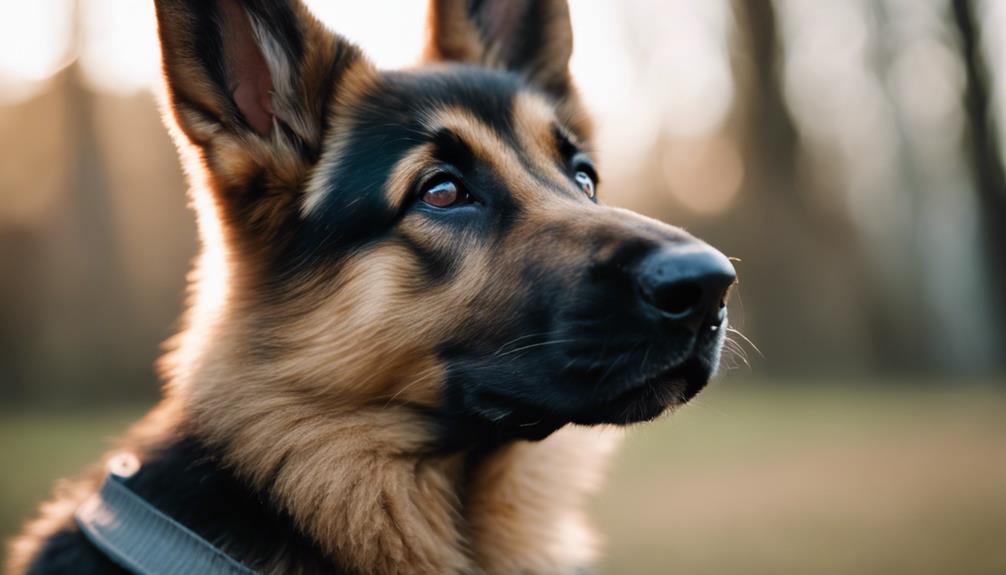
Transitioning from advanced training activities to focusing on patience and consistency, one crucial aspect to remember when training German Shepherd mix puppies is the importance of establishing clear expectations and routines. Patience plays a vital role in building trust and understanding with your puppy. Consistency in training routines reinforces desired behaviors effectively. By setting a predictable schedule, you help shape positive habits and responses. Rewards for good behavior should be immediate and consistent to solidify training progress. It's essential to have realistic expectations, allowing time for your puppy to learn and grow. This process is not just about training your puppy; it's also about building a bond based on trust and mutual respect. Remember, every interaction is an opportunity for both learning and growth, so approach each training session with a positive mindset and a commitment to consistency.
| Key Points | Details |
|---|---|
| Training Routines | Consistency reinforces desired behaviors effectively |
| Patience | Key in building trust and understanding |
| Predictable Schedule | Aids in shaping positive habits and responses |
| Rewards | Immediate and consistent reinforcement is crucial |
Optimal Timing for Training
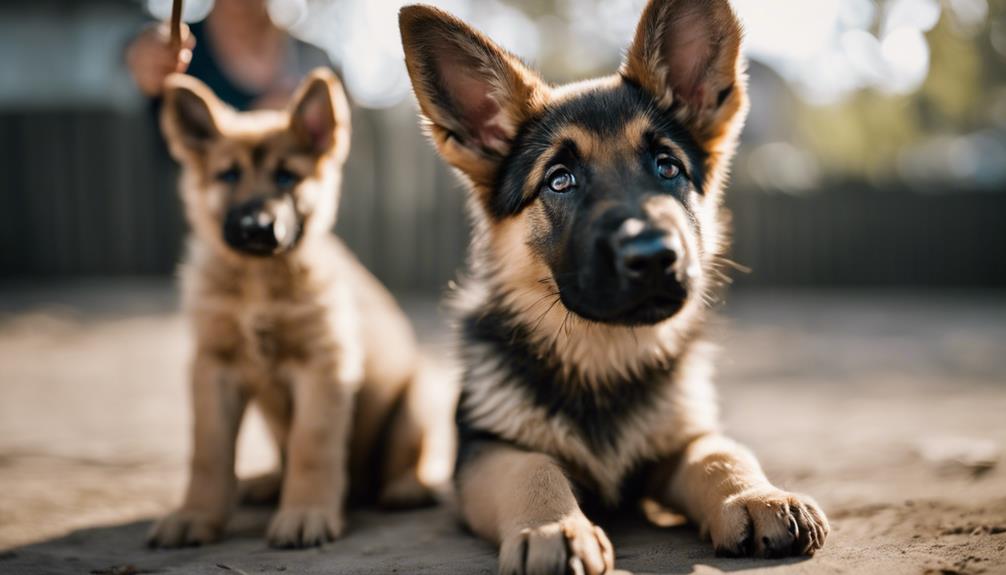
Initiate training for your German Shepherd mix puppy as soon as they join your household to establish positive behavior patterns early on. Training during the early stages is crucial for their development and sets the foundation for future obedience. Here are some key points to consider:
- Critical Socialization Window: German Shepherd mix puppies have a critical socialization window between 8 to 16 weeks. Utilize this time to expose them to various stimuli to prevent future behavior issues.
- Positive Reinforcement: Start training with positive reinforcement techniques early on to shape desirable behaviors and create a strong bond with your puppy.
- Behavior Patterns: Consistent training during the puppy stage helps in shaping well-adjusted adult dogs with good behavior patterns.
- Obedience: Early training instills obedience in German Shepherd mix puppies, making it easier to teach them commands and manners as they grow.
- Development: Training in the early stages aids in the overall development of your puppy, ensuring they grow into well-behaved and well-adjusted adult dogs.
Hiring Professional Dog Trainers
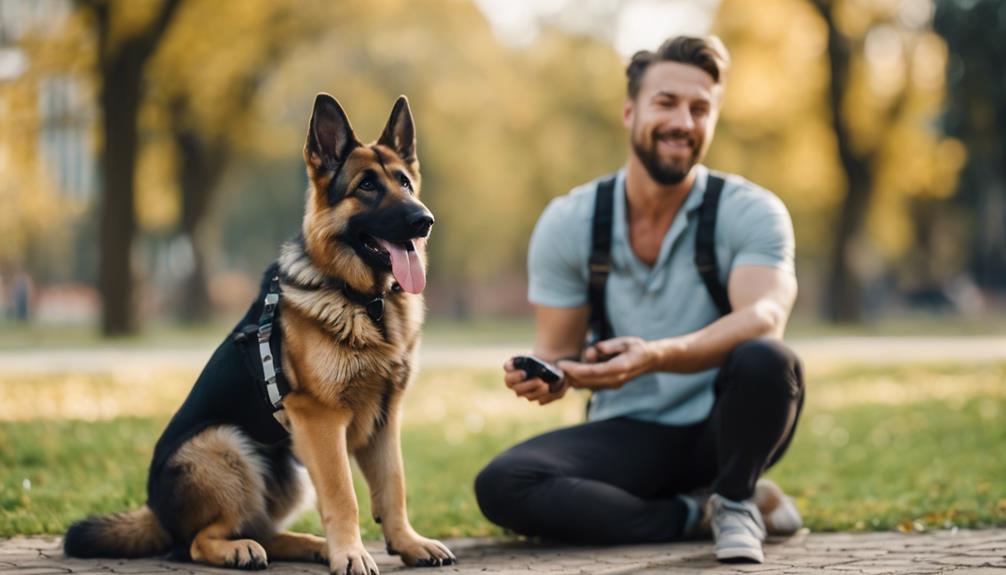
Consider consulting a professional dog trainer to enhance the behavioral development of your German Shepherd mix puppy. Professional dog trainers specialize in creating personalized training plans that cater to the specific needs of your puppy. They are equipped with the knowledge and expertise to address behavioral issues and implement effective training techniques. By working with a professional trainer, you can ensure that the training program is structured and consistent, leading to better results in a shorter period. These trainers can assess the unique needs of your German Shepherd mix puppy and tailor the training to suit them best. Moreover, they can help you tackle specific challenges that may arise during the training process, accelerating the learning curve for your puppy. Investing in the guidance of a professional dog trainer can significantly benefit the behavioral development and overall well-being of your German Shepherd mix puppy.
Frequently Asked Questions
How Do You Train a German Shepherd Mix?
To train a German Shepherd mix effectively, you need to focus on positive reinforcement, consistent training, socialization techniques, obedience commands, mental stimulation, physical exercise, crate training, and leash manners. Tailor your approach to suit their specific traits and needs.
Are German Shepherd Mix Easy to Train?
You'll find that German Shepherd mixes are generally easy to train, especially with positive reinforcement and consistent routines. Socialization skills, puppy classes, clicker training, interactive toys, mental stimulation, and bonding exercises all contribute to successful training.
At What Age Do GSD Puppies Calm Down?
Around 2 to 3 years old, German Shepherd puppies usually start to calm down as they mature. Consistent socialization, positive reinforcement, mental stimulation, and obedience classes contribute to a well-behaved adult. Patience and consistency are key.
Are German Shepherd Puppies Hard to Train?
Training German Shepherd puppies isn't inherently challenging. Positive reinforcement, consistency in routines, socializing, and patience are vital. Emphasize obedience training, mental stimulation, bonding, and leash training. Your efforts will shape a well-mannered and obedient companion.
Conclusion
You've learned the importance of starting behavioral training early for German Shepherd mix puppies. Did you know that puppies have a critical socialization period from 3 to 14 weeks old? This is when they are most receptive to new experiences and learning. By incorporating socialization techniques, crate training, and consistent obedience training, you can help shape a well-adjusted and well-behaved adult dog. Remember, patience and consistency are key to successful training!
